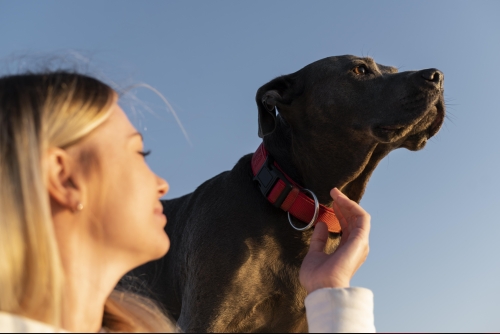If you’re a dog owner, you may have witnessed your dog licking its paws. For many dogs, this behavior is part of their natural grooming routine. However, when this licking becomes excessive, it could be a sign of something more concerning. Understanding why dogs lick their paws and how to address the behavior is crucial for their well-being.
Excessive paw licking can not only be annoying for you as an owner, but it can also lead to health issues like infections, allergies, and skin irritation. In this article, we’ll explore the reasons why dogs lick their paws, how to tell if it’s a problem, and practical solutions to stop this behavior. Whether it’s a simple habit or a sign of a more severe issue, managing your dog’s paw licking can improve their overall health and quality of life.
Understanding Why Dogs Lick Their PawsLet’s Understand Why Do Dogs Lick Their Paws
It’s important to distinguish between normal and excessive paw licking. Dogs lick their paws as part of their natural grooming behavior. Just like cats, dogs often lick their paws to clean dirt, debris, or other substances off their skin. Paw licking can also be a way for dogs to soothe themselves or self-regulate, especially when they’re anxious or stressed.
However, if your dog is licking its paws frequently or compulsively, it may not just be for cleaning or comfort. Excessive licking can indicate that something is wrong, whether it’s an allergy, infection, or injury. Understanding why your dog licks its paws is the first step toward helping them stop.
Common Causes of Excessive Paw LickingAllergies:
Allergies are one of the most common reasons dogs lick their paws. Dogs can be allergic to various substances, including food ingredients, pollen, dust, or chemicals. Allergic reactions often lead to itching, irritation, and inflammation of the skin, especially on the paws when your dog’s paws itch, licking is an automatic response to relieve discomfort.
Food Allergies: Dogs can develop sensitivities to specific proteins, grains, or additives in their food. These allergies often manifest in skin problems, leading dogs to lick their paws.
Environmental Allergies: Pollen, dust mites, or even grass can trigger allergic reactions in dogs, causing them to lick their paws excessively.
Infections and Parasites: Infections can also lead to paw licking. Both fungal and bacterial infections can cause itching and discomfort, which makes your dog lick its paws to soothe the area. In addition to infections, parasites like fleas or mites can also cause similar symptoms.
Fungal or Bacterial Infections: If your dog’s paws have become infected from licking or injury, they may develop sores or blisters, prompting further licking.
Parasites: Fleas or mites on your dog’s paws can cause itching, leading to excessive licking as the dog tries to relieve the irritation.
Anxiety and Stress:
Licking can also be a behavioral response to stress or anxiety. Just as some humans bite their nails when nervous, dogs may lick their paws to comfort themselves. Anxiety-related licking is often a compulsive behavior that worsens over time.
Separation Anxiety: If your dog experiences stress when left alone, they may lick their paws as a form of self-soothing.
Environmental Changes: Stress from new environments, loud noises, or changes in routine can also lead to increased paw licking.
Injury or Pain:
Paw licking may be a sign of injury or pain, especially if your dog is licking a specific paw or part of the paw repeatedly. Dogs often lick their paws to relieve pain caused by cuts, scrapes, foreign objects, or joint issues.
Injuries: If your dog has stepped on something sharp or has developed a wound, they may lick the area in an attempt to clean or relieve pain.
Arthritis or Joint Pain: Older dogs or dogs with joint issues might lick their paws as a response to pain in their joints or muscles.
How to Identify If Paw Licking is a ProblemWhile some paw licking is regular, it’s vital to identify when it becomes excessive. Here are some signs that indicate the licking might be a problem:
Frequency: If your dog licks its paws more than a few times a day or for long periods, this is cause for concern.
Swelling or Redness: Look for signs of inflammation. If the paw is swollen, red, or warm to the touch, this may indicate an infection or irritation.
Odor: A foul odor coming from your dog’s paws can signal a bacterial or fungal infection.
Sores or Open Wounds: Excessive licking can cause skin damage. If you notice sores or cuts on the paws, the behavior could have led to more serious problems.
Limping or Avoidance of Walking: If your dog avoids putting weight on a particular paw, it could be due to injury or pain that is causing them to lick that specific area excessively.
Practical Solutions to Stop Your Dog from Licking Its PawsConsult a Veterinarian: If your dog’s paw licking becomes excessive or is accompanied by signs of infection, pain, or irritation, it’s essential to visit the vet. Your veterinarian will conduct a thorough examination and may recommend tests to determine whether allergies, infections, or other health issues are the cause. Depending on the diagnosis, the vet may prescribe medication topical treatments or recommend lifestyle changes to reduce the licking.
Medical and Topical Treatments: Depending on the cause of the licking, your veterinarian may prescribe antihistamines, antibiotics, or antifungal medications. These treatments can address underlying conditions like allergies or infections. Topical treatments such as medicated shampoos or sprays may also help soothe irritated paws and reduce the urge to lick.
Behavioral Training and Addressing Anxiety: If anxiety is a factor, training and behavioral modification can help alleviate stress and prevent paw licking. Consider using calming aids like pheromone diffusers or anxiety-reducing collars. Also, provide regular mental and physical stimulation to reduce boredom and stress, which are common causes of anxiety-related paw licking.
Natural Remedies: Some pet owners may prefer natural remedies to address paw licking. You can try soaking your dog’s paws in a mixture of water and apple cider vinegar to soothe irritation. Applying coconut oil to dry or irritated paws can also provide relief. Always consult your vet before trying natural remedies to ensure they are safe for your dog.
Preventive Measures: How to Reduce Paw Licking in the FuturePrevention is always better than cure. Here are some tips to help reduce paw licking in the future:
Regular Grooming and Cleaning: Keep your dog’s paws clean and dry. Wipe them down after walks to remove dirt, allergens, or chemicals that may cause irritation. Regularly trim their nails and fur between the pads to prevent debris from accumulating.
Maintain a Healthy Diet: A balanced diet that supports your dog’s health can help reduce allergies and improve overall well-being. Consider feeding your dog high-quality food with limited ingredients if they have food sensitivities.
Use Protective Products: Protect your dog’s paws with products like paw balms, which can help prevent dryness and cracking. You can also use booties or paw protectors during walks in extreme weather conditions or on rough terrain.
FAQs About Dog Paw LickingWhy does my dog lick its paws constantly? Excessive paw licking can be caused by allergies, infections, anxiety, or injury. It’s important to identify the underlying cause.
How can I stop my dog from licking its paws at night? If your dog’s paw licking is related to anxiety, consider using calming aids at night. You can also try putting a sock or protective boot on their paws to reduce licking.
Can food allergies cause paw licking? Yes, food allergies are a common cause of paw licking. If your dog’s diet includes ingredients they are allergic to, this can lead to itching and irritation on their paws.
What are the best treatments for dog paw infections? Treatment will depend on the cause of the infection. Your vet may recommend antibiotics, antifungal treatments, or medicated shampoos.
When should I be concerned about my dog licking its paws? If the licking is frequent, accompanied by swelling, sores, or odor, or if your dog is limping, you should consult your vet to rule out underlying health issues.
ConclusionUnderstanding why dogs lick their paws is the first step in resolving the behavior. Whether it’s due to allergies, infection, stress, or injury, addressing the root cause is key to helping your dog stop this habit. Regular vet checkups, a balanced diet, and proper grooming are all essential to your dog’s health. With the right approach, you can keep your dog’s paws healthy and prevent excessive licking.
If you’re unsure about your dog’s paw licking, don’t hesitate to reach out to a veterinarian for advice and treatment. With the right care, your dog can be comfortable and free of paw-licking problems.












